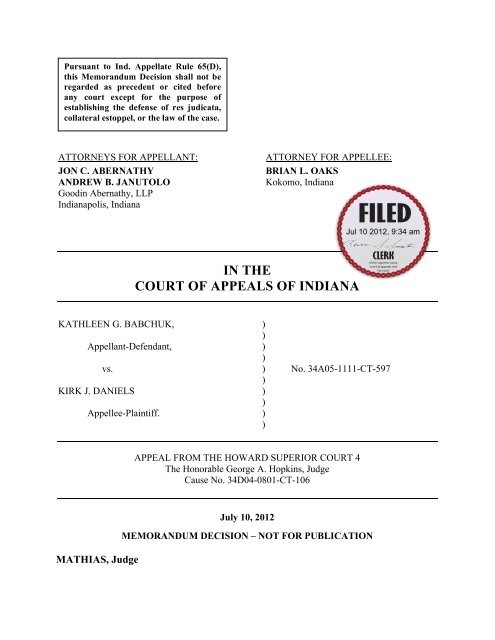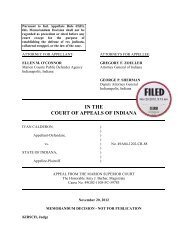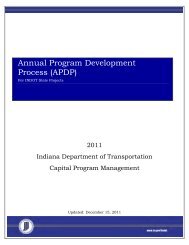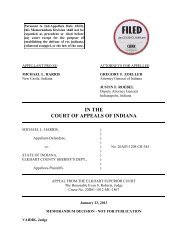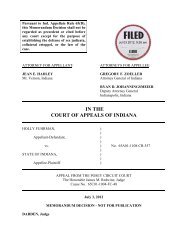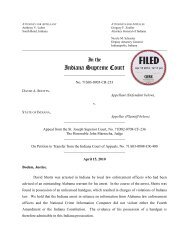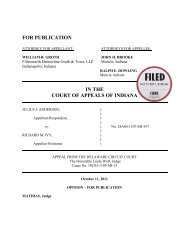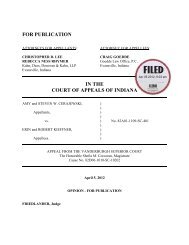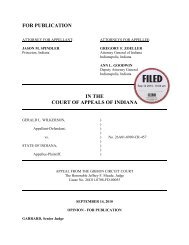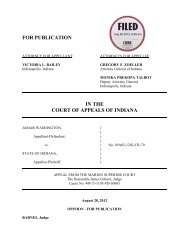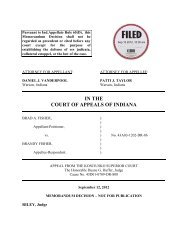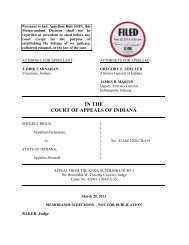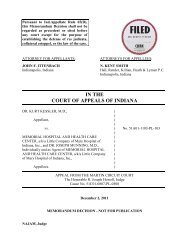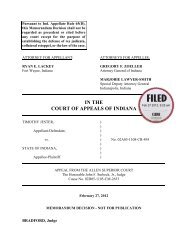Kathleen G. Babchuk v. Kirk J. Daniels - State of Indiana
Kathleen G. Babchuk v. Kirk J. Daniels - State of Indiana
Kathleen G. Babchuk v. Kirk J. Daniels - State of Indiana
You also want an ePaper? Increase the reach of your titles
YUMPU automatically turns print PDFs into web optimized ePapers that Google loves.
Pursuant to Ind. Appellate Rule 65(D),<br />
this Memorandum Decision shall not be<br />
regarded as precedent or cited before<br />
any court except for the purpose <strong>of</strong><br />
establishing the defense <strong>of</strong> res judicata,<br />
collateral estoppel, or the law <strong>of</strong> the case.<br />
ATTORNEYS FOR APPELLANT:<br />
JON C. ABERNATHY<br />
ANDREW B. JANUTOLO<br />
Goodin Abernathy, LLP<br />
<strong>Indiana</strong>polis, <strong>Indiana</strong><br />
ATTORNEY FOR APPELLEE:<br />
BRIAN L. OAKS<br />
Kokomo, <strong>Indiana</strong><br />
IN THE<br />
COURT OF APPEALS OF INDIANA<br />
KATHLEEN G. BABCHUK, )<br />
)<br />
Appellant-Defendant, )<br />
)<br />
vs. ) No. 34A05-1111-CT-597<br />
)<br />
KIRK J. DANIELS )<br />
)<br />
Appellee-Plaintiff. )<br />
)<br />
APPEAL FROM THE HOWARD SUPERIOR COURT 4<br />
The Honorable George A. Hopkins, Judge<br />
Cause No. 34D04-0801-CT-106<br />
MATHIAS, Judge<br />
July 10, 2012<br />
MEMORANDUM DECISION – NOT FOR PUBLICATION
<strong>Kirk</strong> <strong>Daniels</strong> (“<strong>Daniels</strong>”) filed a claim in Howard Superior Court against <strong>Kathleen</strong><br />
<strong>Babchuk</strong> (“<strong>Kathleen</strong>”), alleging that <strong>Kathleen</strong> had written a letter defaming him. The<br />
trial court subsequently denied several <strong>of</strong> <strong>Kathleen</strong>’s motions, including her motion for<br />
summary judgment, her Anti-SLAPP 1 motion, and her motion for judgment on the<br />
evidence. After the jury found in favor <strong>of</strong> <strong>Daniels</strong>, <strong>Kathleen</strong> filed a motion to correct<br />
error which the trial court also denied. On appeal, <strong>Kathleen</strong> presents two issues, which<br />
we renumber and restate as:<br />
I. Whether the content <strong>of</strong> <strong>Kathleen</strong>’s letter was not defamatory as a matter <strong>of</strong><br />
law;<br />
II.<br />
III.<br />
Whether the content <strong>of</strong> <strong>Kathleen</strong>’s letter was protected by a qualified<br />
privilege; and<br />
Whether <strong>Daniels</strong>’s complaint should have been dismissed under <strong>Indiana</strong>’s<br />
Anti-SLAPP statutes.<br />
We affirm.<br />
Facts and Procedural History<br />
In 2007, <strong>Kathleen</strong> and her then-husband, Dr. William <strong>Babchuk</strong> (“William”) were<br />
in the process <strong>of</strong> getting divorced. On April 20, 2007, the <strong>Babchuk</strong>s attended a courtordered<br />
mediation session. Also in attendance was <strong>Daniels</strong>, who had been invited by<br />
William to help ascertain the couple’s assets. <strong>Daniels</strong> is a financial planner based in<br />
Kokomo, <strong>Indiana</strong>. After providing the requested documents, <strong>Daniels</strong> left the mediation,<br />
1<br />
“Strategic lawsuits against public participation (SLAPPs) are ‘meritless suits aimed at silencing a<br />
plaintiff’s opponents, or at least diverting their resources.’” Nexus Grp., Inc. v. Heritage Appraisal Serv.,<br />
942 N.E.2d 119, 122 (Ind. Ct. App. 2011) (quoting John C. Barker, Common–Law and Statutory<br />
Solutions to the Problem <strong>of</strong> SLAPPS, 26 Loy. L.A. L. Rev. 395, 403 (1993)). <strong>Indiana</strong> adopted an Anti-<br />
SLAPP act in 1998 in order to discourage such lawsuits. See Ind. Code §§ 34-7-7-1 through 34-7-7-10;<br />
see also Nexus, 942 N.E.2d at 122.<br />
2
which continued for approximately three more hours.<br />
Pursuant to the mediation<br />
agreement, the <strong>Babchuk</strong>s agreed to divide certain assets. Among the assets was an A.G.<br />
Edwards Self Employment Pension (“SEP”) account containing at that time<br />
approximately $634,000. The <strong>Babchuk</strong>s agreed that $500,000 <strong>of</strong> this account was to go<br />
to <strong>Kathleen</strong>.<br />
Five days after the mediation session, William told <strong>Daniels</strong> to transfer $500,000<br />
out <strong>of</strong> the A.G. Edwards account to a new account with Gunn Allen, the firm that<br />
supervised <strong>Daniels</strong>. This transfer occurred two days later, on April 27, 2007. 2<br />
According<br />
to <strong>Daniels</strong>, the funds were transferred in an effort to “hedge” the $500,000, i.e., avoid any<br />
market fluctuations that might have affected the value <strong>of</strong> the A.G. Edwards account.<br />
When <strong>Kathleen</strong> discovered this transaction, she filed a request for a temporary restraining<br />
order to prevent the transfer <strong>of</strong> marital property. <strong>Kathleen</strong> also agreed that she would<br />
bear the risk <strong>of</strong> any market loss in the A.G. Edwards account. On May 1, 2007, the trial<br />
court granted the request for a temporary restraining order, and on May 10, 2007, the<br />
funds were returned to the A.G. Edwards account. Also on May 10, 2007, the parties<br />
agreed to a final restraining order.<br />
Allen:<br />
On August 2, 2007, <strong>Kathleen</strong> sent the following letter to general counsel at Gunn<br />
August 2, 2007<br />
Mr. David Jarvis<br />
General Counsel<br />
2<br />
Although A.G. Edwards transferred the money to the new account on April 27, the funds were not<br />
received until May 7, 2007.<br />
3
Gunn Allen Financial, Inc.<br />
5002 West Waters Avenue<br />
Tampa, Florida 33634<br />
Dear Mr. Jarvis:<br />
RE: <strong>Kirk</strong> J. <strong>Daniels</strong><br />
The purpose <strong>of</strong> this correspondence is to request your review <strong>of</strong> the<br />
unethical conduct by one <strong>of</strong> your representatives, Mr. <strong>Kirk</strong> J. <strong>Daniels</strong>. I<br />
have submitted this concern to the <strong>Indiana</strong> Secretary <strong>of</strong> <strong>State</strong>, Securities<br />
Division, as well as the North American Securities Administrators<br />
Association.<br />
The following incident provides only one example <strong>of</strong> Mr. <strong>Daniels</strong>’<br />
unpr<strong>of</strong>essional conduct. I have other recorded events <strong>of</strong> his improprieties<br />
spanning the most recent three year period with supporting documentation<br />
to verify said events.<br />
The following summarizes the unethical transfer <strong>of</strong> funds out <strong>of</strong> the A.G.<br />
Edwards account #4886, to an account managed by Mr. <strong>Daniels</strong>. This<br />
action resulted in the generation <strong>of</strong> a court order restraining this illegal<br />
transfer.<br />
On Friday, April 20, 2007, starting at approximately 8:00 am, <strong>Kirk</strong> <strong>Daniels</strong><br />
attended and actively participated in the mediation negotiations for the<br />
dissolution <strong>of</strong> the marriage for William I. <strong>Babchuk</strong> vs <strong>Kathleen</strong> <strong>Babchuk</strong>.<br />
<strong>Daniels</strong> represented William <strong>Babchuk</strong> as his securities/investment advisor.<br />
The meeting took place at the law <strong>of</strong>fice <strong>of</strong> Mir<strong>of</strong>f, Cross & Woolse . . . .<br />
A final mediation agreement was obtained at approximately 8:30 pm. The<br />
mediator was Darryn L. Duchon and representing counsels included Nancy<br />
Cross and Greg Noland.<br />
Within the week following this mediation, <strong>Daniels</strong> and William <strong>Babchuk</strong><br />
took actions inconsistent with the terms <strong>of</strong> the court binding mediated<br />
agreement; specifically they placed orders to transfer all funds out <strong>of</strong> the<br />
A.G. Edwards account #4886 over to Pershings, which was managed by<br />
<strong>Kirk</strong> <strong>Daniels</strong>. The account #4886 was actually moved over to the Pershings’<br />
company and remained there for one week before being returned to the A.G.<br />
Edwards’ company. Attached are copies <strong>of</strong> said mediation agreement and<br />
the court order restraining the transfer <strong>of</strong> property.<br />
Throughout this entire legal mediation there has been inadequate<br />
documentation for accounts managed by <strong>Daniels</strong>. Actual monthly and<br />
annual statements summarizing the assets managed by <strong>Daniels</strong> were not<br />
4
provided. Instead, <strong>Daniels</strong> attended the mediation meetings with his<br />
personal laptop and printed out random reports. Comprehensive reporting<br />
<strong>of</strong> accounts managed by <strong>Daniels</strong> was requested by legal counsel, and not<br />
provided. Provision <strong>of</strong> said documentation is requested from you to<br />
support the enclosed mediation agreement.<br />
During my conversation with Sue Walsh this morning she asked that I<br />
provide my contact information. . . . Please contact me if you have any<br />
further questions or wish to receive the additional evidence I have compiled.<br />
Sincerely,<br />
/s/<br />
<strong>Kathleen</strong> G. <strong>Babchuk</strong>.<br />
Enclosures:<br />
1) FAX transmittal to A.G. Edwards & RBC Dain Rauscher<br />
2) Mir<strong>of</strong>f FAX transmittal <strong>of</strong> Restraining Order<br />
3) Verified Emergency Petition for Temporary Restraining Order<br />
4) Temporary Restraining Order Against the Transfer <strong>of</strong> Property<br />
[5]) Agreed Restraining Order Against the Transfer <strong>of</strong> Property<br />
6) Mediation Agreement 4-20-07<br />
7) Request for Production <strong>of</strong> Documents from W. Babchuck, July 2006<br />
Appellant’s App. pp. 142-43. <strong>Kathleen</strong> sent the letter not only to Mr. Jarvis, but also to<br />
the Financial Industry Regulatory Authority, Inc., the Securities Division <strong>of</strong> the <strong>Indiana</strong><br />
Secretary <strong>of</strong> <strong>State</strong>’s Office, and the North American Securities Administrators<br />
Association.<br />
As a result <strong>of</strong> <strong>Kathleen</strong>’s letter, <strong>Daniels</strong> was placed on a period <strong>of</strong> enhanced<br />
supervision with Gunn Allen, and Gunn Allen itself was also investigated by regulatory<br />
authorities. However, Gunn Allen’s subsequent investigation revealed no wrongdoing on<br />
the part <strong>of</strong> <strong>Daniels</strong>. On August 7, 2007, five days after the date <strong>of</strong> <strong>Kathleen</strong>’s letter, the<br />
parties signed a final property settlement agreement.<br />
5
On January 28, 2008, <strong>Daniels</strong> filed a defamation complaint against <strong>Kathleen</strong>. On<br />
April 15, 2008, <strong>Kathleen</strong> responded by filing a motion to dismiss pursuant to <strong>Indiana</strong>’s<br />
Anti-SLAPP statutes, along with a counterclaim for abuse <strong>of</strong> process. On November 6,<br />
2008, <strong>Kathleen</strong> filed a motion for summary judgment on <strong>Daniels</strong>’s claim <strong>of</strong> defamation.<br />
The trial court held a hearing on <strong>Kathleen</strong>’s motion to dismiss under the Anti-SLAPP<br />
statutes on December 17, 2008, and the trial court issued an order denying the motion to<br />
dismiss on December 30, 2008. 3<br />
After several delays, a hearing on <strong>Kathleen</strong>’s motion for<br />
summary judgment was held on February 3, 2010. The trial court denied <strong>Kathleen</strong>’s<br />
motion for summary judgment on February 16, 2010.<br />
After an unsuccessful attempt at mediation, a jury trial commenced on September<br />
13, 2011. The following day, after the close <strong>of</strong> <strong>Daniels</strong>’s case-in-chief, <strong>Kathleen</strong> moved<br />
for judgment on the evidence and renewed her Anti-SLAPP motion. The trial court<br />
denied these motions after a hearing. At the conclusion <strong>of</strong> the trial, the jury returned a<br />
verdict in favor <strong>of</strong> <strong>Daniels</strong> in the amount <strong>of</strong> $35,000. <strong>Kathleen</strong> filed a motion to correct<br />
error on October 14, 2011, which the trial court denied on November 1, 2011. <strong>Kathleen</strong><br />
now appeals.<br />
I. Defamation<br />
<strong>Kathleen</strong>’s first argument is that the statements contained in her letter did not<br />
constitute defamation as a matter <strong>of</strong> law. This argument is directed at the trial court’s<br />
3 On January 28, 2009, <strong>Kathleen</strong> filed a motion to reconsider the court’s denial <strong>of</strong> her motion to dismiss,<br />
or in the alternative, to certify its order for interlocutory appeal. The trial court denied both <strong>of</strong> these<br />
requests on February 24, 2009.<br />
6
denial <strong>of</strong> <strong>Kathleen</strong>’s motion for summary judgment, her motion for judgment on the<br />
evidence, and her motion to correct error.<br />
A. Standards <strong>of</strong> Review<br />
On an appeal from a trial court’s ruling on a motion for summary judgment, our<br />
standard <strong>of</strong> review is well settled:<br />
A party is entitled to summary judgment upon demonstrating the absence <strong>of</strong><br />
any genuine issue <strong>of</strong> fact as to a determinative issue unless the non-moving<br />
party comes forward with contrary evidence showing an issue <strong>of</strong> fact for<br />
trial. An appellate court reviewing a trial court summary judgment ruling<br />
likewise construes all facts and reasonable inferences in favor <strong>of</strong> the nonmoving<br />
party and determines whether the moving party has shown from the<br />
designated evidentiary matter that there is no genuine issue as to any<br />
material fact and that it is entitled to judgment as a matter <strong>of</strong> law. But a de<br />
novo standard <strong>of</strong> review applies where the dispute is one <strong>of</strong> law rather than<br />
fact.<br />
Florian v. Gatx Rail Corp., 930 N.E.2d 1190, 1194 (Ind. Ct. App. 2010), trans. denied<br />
(quoting Dugan v. Mittal Steel USA Inc., 929 N.E.2d 184, 185-86 (Ind. 2010)).<br />
Our standard <strong>of</strong> review <strong>of</strong> a trial court’s ruling on a motion for judgment on the<br />
evidence is the same standard that governs the trial court in making its decision. <strong>State</strong><br />
Farm Mut. Auto. Ins. Co. v. Noble, 854 N.E.2d 925, 931 (Ind. Ct. App. 2006), trans.<br />
denied. Judgment on the evidence is proper where all or some <strong>of</strong> the issues are not<br />
supported by sufficient evidence, and the motion should be granted only where there is<br />
no substantial evidence to support an essential issue in the case. Id. On appeal, we<br />
examine only the evidence and the reasonable inferences that may be drawn therefrom<br />
that are most favorable to the non-moving party. Id. If there is evidence that would<br />
7
allow reasonable people to differ as to the result, judgment on the evidence is improper.<br />
Id.; see also Ind. Trial Rule 50(A).<br />
In general, this court reviews the trial court’s ruling on a motion to correct error<br />
for an abuse <strong>of</strong> discretion. City <strong>of</strong> <strong>Indiana</strong>polis v. Hicks, 932 N.E.2d 227, 230 (Ind. Ct.<br />
App. 2010), trans. denied. However, to the extent the issues presented with regard to the<br />
motion to correct error are purely questions <strong>of</strong> law, our review is de novo. Id. <strong>Kathleen</strong><br />
argues that the statements in her letter were not defamatory as a matter <strong>of</strong> law. Thus,<br />
whether framed as an issue <strong>of</strong> the propriety <strong>of</strong> summary judgment, judgment on the<br />
evidence, or a motion to correct error, our standard <strong>of</strong> review is essentially the same.<br />
B. Defamation<br />
In Dugan, supra, our supreme court summarized the law <strong>of</strong> defamation in <strong>Indiana</strong>:<br />
To establish a claim <strong>of</strong> defamation, a plaintiff must prove the existence <strong>of</strong> a<br />
communication with defamatory imputation, malice, publication, and<br />
damages. A statement is defamatory if it tends to harm a person’s<br />
reputation by lowering the person in the community’s estimation or<br />
deterring third persons from dealing or associating with the person. One<br />
type <strong>of</strong> defamation action, alleging defamation per se, arises when the<br />
language <strong>of</strong> a statement, without reference to extrinsic evidence, constitutes<br />
an imputation <strong>of</strong> (1) criminal conduct, (2) a loathsome disease, (3)<br />
misconduct in a person’s trade, pr<strong>of</strong>ession, <strong>of</strong>fice, or occupation, or (4)<br />
sexual misconduct. In contrast, if the words used are not defamatory in<br />
themselves, but become so only when understood in the context <strong>of</strong> extrinsic<br />
evidence, they are considered defamatory per quod. In actions for<br />
defamation per se, damages are presumed, but in actions for defamation per<br />
quod, a plaintiff must prove damages.<br />
929 N.E.2d at 186 (citations and internal quotations omitted). In addition, “[t]he framers<br />
<strong>of</strong> the <strong>Indiana</strong> Constitution placed high value on reputation,” and “[o]ur Constitution<br />
provides that ‘All courts shall be open; and every person, for injury done to him in his<br />
8
person, property, or reputation, shall have remedy by due course <strong>of</strong> law.’” Kelley v.<br />
Tanoos, 865 N.E.2d 593, 596 (Ind. 2007) (quoting Ind. Const. art. 1, § 12) (emphasis<br />
added).<br />
<strong>Kathleen</strong> first insists that the factual statements in her letter are true. It is well<br />
settled in our state that a defendant cannot be held liable for defamation if the statement<br />
made was true. “Our constitution provides: ‘In all prosecutions for libel, the truth <strong>of</strong> the<br />
matters alleged to be libellous, may be given in justification.’” Cortez v. Jo-Ann Stores,<br />
Inc., 827 N.E.2d 1223, 1230 (Ind. Ct. App. 2005) (quoting Ind. Const. art. 1, § 10).<br />
Accordingly, in <strong>Indiana</strong>, true statements can never give rise to liability for defamation. Id.<br />
See also Williams v. Tharp, 914 N.E.2d 756, 767 (Ind. 2009) (noting that “liability for<br />
defamation does not exist where statements are true.”).<br />
<strong>Daniels</strong> disputes <strong>Kathleen</strong>’s claims that her statements are true, and first attacks<br />
the claim in <strong>Kathleen</strong>’s letter that <strong>Daniels</strong> and William “took actions inconsistent with the<br />
terms <strong>of</strong> the court binding mediated agreement.” Appellant’s App. p. 142. <strong>Daniels</strong> notes<br />
that William asked him to transfer the funds out <strong>of</strong> the A.G. Edwards account on April 25,<br />
2007 and that the temporary restraining order did not go into effect until May 1, 2007.<br />
He further claims that the transfer <strong>of</strong> the funds did not change the title on the account and<br />
that <strong>Kathleen</strong> always remained a beneficiary <strong>of</strong> the account.<br />
<strong>Kathleen</strong> is <strong>of</strong> the opinion that she was entitled to the $500,000 from the specific<br />
A.G. Edwards account listed in the mediation agreement, whereas <strong>Daniels</strong> claims the<br />
mediation agreement simply entitled <strong>Kathleen</strong> to $500,000 and the particulars <strong>of</strong> the<br />
account are immaterial.<br />
The mediated settlement agreement consists <strong>of</strong> a printed<br />
9
spreadsheet listing various assets, their “Marital Pot Value,” and the portion there<strong>of</strong><br />
<strong>Kathleen</strong> or William were entitled to. <strong>Kathleen</strong> and William, and their respective<br />
attorneys signed the last page <strong>of</strong> this mediated agreement. <strong>Kathleen</strong> refers us to no<br />
evidence indicating that the mediation agreement was “binding” or that she was entitled<br />
to the funds from that specific A.G. Edwards account. All the mediated agreement<br />
indicates is that she was entitled to $500,000 <strong>of</strong> the value <strong>of</strong> the A.G. Edwards account.<br />
<strong>Kathleen</strong>’s letter also claims that <strong>Daniels</strong> had committed “improprieties spanning<br />
the most recent three year period.” Yet she refers us to no evidence supporting her claim<br />
that this statement was truthful. Moreover, <strong>Daniels</strong> denied this claim in his deposition.<br />
Construing the designated evidence in the light most favorable to <strong>Daniels</strong>, we must<br />
conclude that there was at least a genuine issue <strong>of</strong> material fact regarding the truthfulness<br />
<strong>of</strong> <strong>Kathleen</strong>’s statement in the letter that <strong>Daniels</strong> actions were inconsistent with the<br />
mediation agreement.<br />
The trial court therefore properly denied <strong>Kathleen</strong>’s motions<br />
seeking judgment in her favor as a matter <strong>of</strong> law.<br />
C. Matters <strong>of</strong> Opinion<br />
<strong>Kathleen</strong> also argues that the other statements in her letter, including that<br />
<strong>Daniels</strong>’s behavior was “unethical,” “unpr<strong>of</strong>essional,” and “illegal,” were simply matters<br />
<strong>of</strong> opinion that were not actionable defamation. While we agree that whether someone<br />
acted “pr<strong>of</strong>essionally” might well be a matter <strong>of</strong> opinion, we cannot agree that the same<br />
holds true with regard to the use <strong>of</strong> the words “unethical” and “illegal.” Accusing<br />
someone <strong>of</strong> unethical conduct is not merely stating a disagreement with the manner in<br />
which they behaved; it is an accusation that someone breached a code, written or<br />
10
unwritten, <strong>of</strong> ethics. Similarly, saying that <strong>Daniels</strong>’ behaved “illegally” is not a matter <strong>of</strong><br />
opinion, but an accusation that he broke the law. Thus, the contents <strong>of</strong> <strong>Kathleen</strong>’s letter<br />
were not purely matters <strong>of</strong> opinion, and the question <strong>of</strong> whether these accusations were<br />
true were issues <strong>of</strong> fact to be determined at trial. We therefore cannot agree with<br />
<strong>Kathleen</strong> that she was entitled to judgment as a matter <strong>of</strong> law.<br />
II. Qualified Privilege<br />
<strong>Kathleen</strong> also claims that her statements in the letter were protected by a<br />
“qualified privilege.” A qualified privilege applies to communications made in good<br />
faith on any subject matter in which the party making the communication has an interest<br />
or in reference to which he had a duty, either public or private, either legal, moral, or<br />
social, if made to a person having a corresponding interest or duty. Williams, 914 N.E.2d<br />
at 762. In the context <strong>of</strong> defamation law, “good faith” has been defined as “‘a state <strong>of</strong><br />
mind indicating honesty and lawfulness <strong>of</strong> purpose; belief in one’s legal right; and a<br />
belief that one’s conduct is not unconscionable.’” Nexus Grp., Inc. v. Heritage Appraisal<br />
Serv., 942 N.E.2d 119, 122 (Ind. Ct. App. 2011) (quoting Owens v. Schoenberger, 681<br />
N.E.2d 760, 764 (Ind. Ct. App. 1997)).<br />
As a defense to a claim <strong>of</strong> defamation, a qualified privilege does not operate to<br />
change the actionable quality <strong>of</strong> the words published, but merely to rebut the inference <strong>of</strong><br />
malice that is otherwise imputed. Williams, 914 N.E.2d at 762. To merit the protection<br />
<strong>of</strong> a qualified privilege the defendant bears the initial burden to establish the existence <strong>of</strong><br />
a privileged occasion for the publication, by pro<strong>of</strong> <strong>of</strong> a recognized public or private<br />
interest which would justify the utterance <strong>of</strong> the words. Id. Once the defendant meets<br />
11
this burden, the plaintiff then has the burden <strong>of</strong> overcoming that privilege by showing<br />
that it has been “abused.” In this sense, the essence <strong>of</strong> the concept <strong>of</strong> “abuse” is not the<br />
speaker’s spite but his abuse <strong>of</strong> the privileged occasion by going beyond the scope <strong>of</strong> the<br />
purposes for which privilege exists. Id.<br />
A jury should determine as questions <strong>of</strong> fact whether a defendant acted in good<br />
faith, whether the privilege was abused by excessive publication, whether the defendant<br />
used the occasion for an improper purpose, or whether the defendant lacked grounds for<br />
belief in the truth <strong>of</strong> the statement. Cortez, 827 N.E.2d at 1234. If different inferences<br />
and conclusions could reasonably be drawn from the evidence, then the question <strong>of</strong> abuse<br />
<strong>of</strong> privilege must be submitted to the jury. Id.; see also Williams, 914 N.E.2d at 762<br />
(“Unless only one conclusion can be drawn from the evidence, the question <strong>of</strong> whether<br />
the privilege has been abused is for the jury.”) (quoting Kelley, 865 N.E.2d at 601).<br />
<strong>Kathleen</strong> notes that she designated evidence indicating that she did act in good<br />
faith, i.e. she wrote the letter to inform authorities regarding what she believed to be<br />
<strong>Daniels</strong>’s unethical and illegal behavior. This, she claims, is unrefuted evidence <strong>of</strong> her<br />
good faith. But <strong>Daniels</strong> notes that, given the timing <strong>of</strong> the various events at issue, and the<br />
content <strong>of</strong> the letter, and construing all reasonable inferences in his favor, there was a<br />
genuine issue <strong>of</strong> material fact regarding <strong>Kathleen</strong>’s good faith. Given our standard <strong>of</strong><br />
review, we must agree with <strong>Daniels</strong>.<br />
<strong>Daniels</strong> did not violate a restraining order by transferring the $500,000, and the<br />
mediation agreement contains no explicit prohibition against transferring this money out<br />
<strong>of</strong> the particular A.G. Edwards account. Further, the letter accuses <strong>Daniels</strong> <strong>of</strong> printing<br />
12
out “random reports” and generally being unhelpful during the mediation. It also vaguely<br />
accuses <strong>Daniels</strong> <strong>of</strong> other “improprieties” without further elaboration. Under these facts<br />
and circumstances, we must conclude that there was a genuine issue <strong>of</strong> material fact<br />
regarding whether <strong>Kathleen</strong> acted in good faith. See Kelley, 865 N.E.2d at 598<br />
(“Whether a defendant acted in good faith in making a statement usually is a question <strong>of</strong><br />
fact for the jury.”). Therefore, the trial court properly concluded that <strong>Kathleen</strong> was not<br />
entitled to judgment as a matter <strong>of</strong> law on the issue <strong>of</strong> qualified privilege.<br />
III. Anti-SLAPP Statutes<br />
Lastly, <strong>Kathleen</strong> claims that the trial court erred in denying her motion based on<br />
<strong>Indiana</strong>’s Anti-SLAPP statutes.<br />
If a person files a motion to dismiss pursuant to<br />
<strong>Indiana</strong>’s Anti-SLAPP statutes, the trial court shall treat the motion as a motion for<br />
summary judgment. Ind. Code § 34-7-7-9; Nexus, 942 N.E.2d at 122. Section 5 <strong>of</strong> the<br />
Anti-SLAPP Chapter provides in pertinent part:<br />
It is a defense in a civil action against a person that the act or omission<br />
complained <strong>of</strong> is:<br />
(1) an act or omission <strong>of</strong> that person in furtherance <strong>of</strong> the person’s right<br />
<strong>of</strong> petition or free speech under the Constitution <strong>of</strong> the United <strong>State</strong>s or<br />
the Constitution <strong>of</strong> the <strong>State</strong> <strong>of</strong> <strong>Indiana</strong> in connection with a public<br />
issue; [4] and<br />
(2) an act or omission taken in good faith and with a reasonable basis in<br />
law and fact.<br />
Ind. Code § 34-7-7-5.<br />
4 As set forth in <strong>Indiana</strong> Code § 34-7-7-2, the phrase “act in furtherance <strong>of</strong> a person’s right <strong>of</strong> petition or<br />
free speech under the Constitution <strong>of</strong> the United <strong>State</strong>s or the Constitution <strong>of</strong> the <strong>State</strong> <strong>of</strong> <strong>Indiana</strong> in<br />
connection with a public issue” is defined to include “any conduct in furtherance <strong>of</strong> the exercise <strong>of</strong> the<br />
constitutional right <strong>of</strong>: (1) petition; or (2) free speech; in connection with a public issue or an issue <strong>of</strong><br />
public interest.”<br />
13
We have already determined above in our discussion regarding the qualified<br />
privilege that there was a genuine issue <strong>of</strong> material fact with regard to <strong>Kathleen</strong>’s good<br />
faith. Because <strong>Kathleen</strong>’s good faith is an element <strong>of</strong> her Anti-SLAPP motion, we also<br />
conclude that she was not entitled to dismissal <strong>of</strong> <strong>Daniels</strong>’s defamation claims based on<br />
the Anti-SLAPP statutes. In short, the trial court properly denied <strong>Kathleen</strong>’s motion to<br />
dismiss.<br />
Affirmed.<br />
ROBB, C.J., and BAILEY, J., concur.<br />
14


